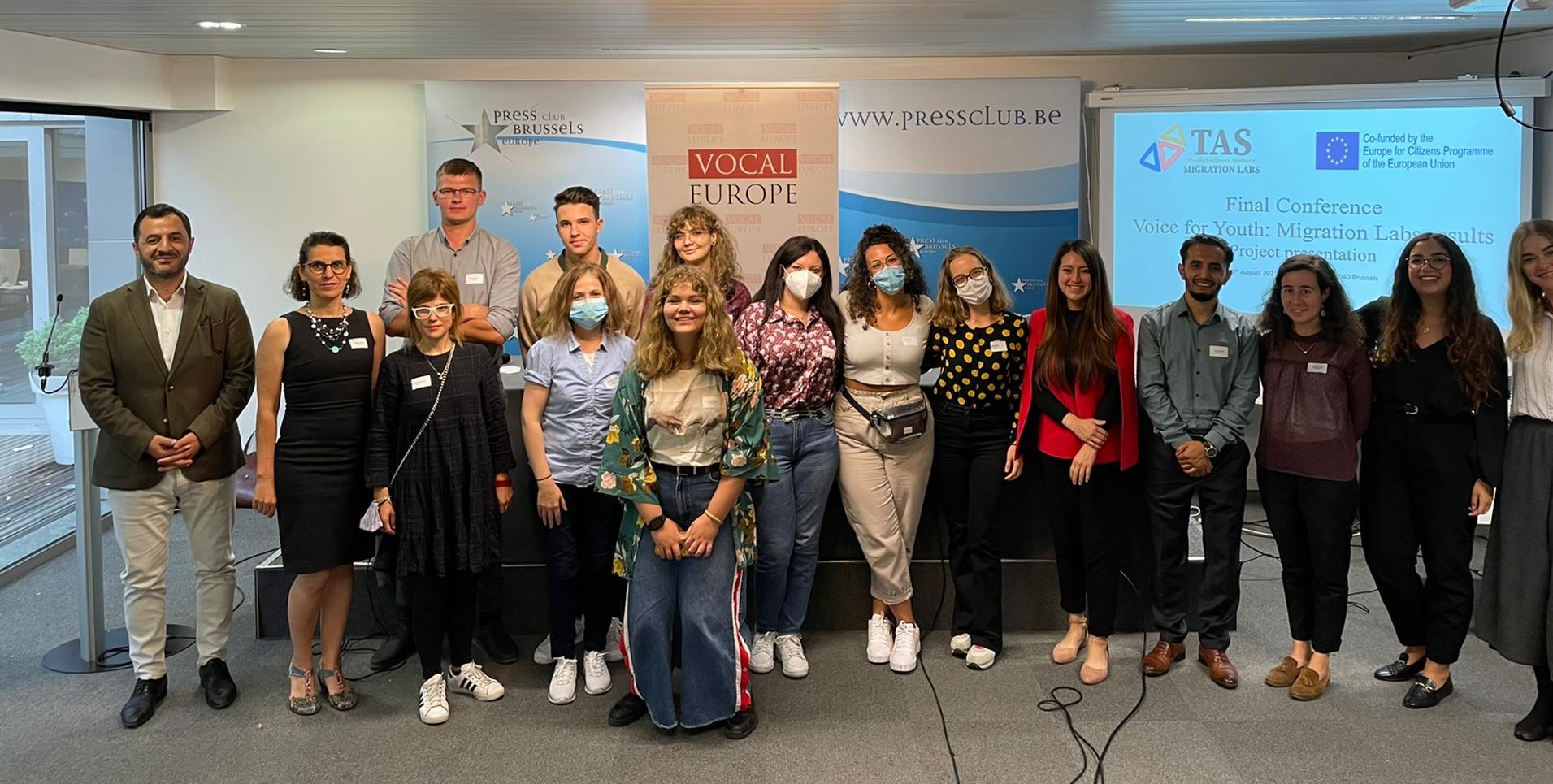Vocal Europe is proud to announce that in August 2021 the TAS LAB project was successfully finalised. The project was funded by the EU program “Europe for Citizens” and implemented over the course of 18 months together with our partners from Romania – ACTA Center (
https://www.actacenter.ro/), Italy – Cooperazione Paesi Emergenti (
https://cope.it/it/), Portugal – Instituto Marques de Valle Flor (
https://www.imvf.org/en/home/) and Serbia – Terraforming (
https://terraforming.org/).
Despite the challenges related to the outbreak of coronavirus during the implementation period, the project managed to reach all of its planned results and to receive positive feedback from the beneficiaries. Vocal Europe organised 5 workshops, 1 multiplier event and 1 final international event to raise awareness on the different migrants’ groups in Europe and on the different patterns, paths and specificities related to their migration. The 5 workshops were structured in a thesis, antithesis and synthesis format (TAS): during the first 2 thesis workshops the beneficiaries were presented with key concepts and an overview of the migrants’ groups, their history and current situation, and the migration patterns and paths were shared and discussed.
During the two antithesis workshops, participants discussed counter narratives on common migrants and refugees-related misconceptions and stereotypes. The fifth synthesis workshop summarised the lessons learned and served as a base for formulation of a recommendation paper with opinions and suggestions which was then presented to EU policy makers during the international event. The project also involved EU Solidarity Corps Volunteers in volunteering activities related to the project and hosting organisation’s needs.
The 1. workshop took place on 28 May 2020 and involved 21 participants joining online, mainly from Belgium. This event focused on Youth Perspectives on Migration: Responsibilities and Expectations.
The 2. workshop took place on 23 July 2020 and involved 32 participants joining online, mainly from Belgium. This event focused on Refugee Integration: Opportunities, Challenges and Agency.
The 3. workshop took place on 8 December 2020 and involved 34 participants joining online, mainly from Belgium.This event focused on Rethinking Migration Policies in the context of a Pandemic.
The 4. workshop took place on 17 March 2021 and involved 27 participants joining online, mainly from Belgium. This event focused on Underrepresentation of Migrants as Legitimate Voices in Europe.
The 5. workshop took place on 1 June 2021 and involved 23 participants joining online, mainly from Belgium. This event focused on Addressing Narratives on Common Stereotypes and Misconceptions About Migration Through Intercultural Dialogue.
The Multiplier Event took place on 18 August 2021 and involved 23 participants joining online, mainly from Belgium. This event focused on Migration Labs results: experts’ view.
The Final Conference took place on 10 August 2021 in Brussels and the participants could join both in person or virtually. There were 56 participants in this event, 36 joined virtually and 20 came to the event location in Brussels. The participants were from various countries from and outside of the EU, including the 5 partner countries. This event focused on Voice for Youth: Migration Labs results.
The most important achievement can be considered as two-fold: first is the contribution to the open public debate about the topic of migration and second is the opportunity for active participation of young people. Firstly, it has been stated multiple times by the project beneficiaries and involved experts that the key to tackle issues related to migration and surrounding narratives is to keep pushing towards open and balanced debate, spreading information and building general knowledge. Hundreds of people (network of all involved partners) were informed about project activities, experts’ presentations, various online articles or recommendation papers. The project managed to create an opportunity for informed, constructive and fruitful debate, for sharing of relevant data and online content and the project website is an achievement that will even stay alive after the implementation period.
Secondly, based on the feedback collected from the beneficiaries, there is still a lot of room for improvement when it comes to giving voice to the youth, to motivating their active engagement and to involving them in the policy-making process. Therefore, the fact that young people from various countries could learn from each other, express their opinions and cooperate on the formulation of recommendation papers can be considered as a very desirable and welcomed achievement.
We would like to thank the donor and our partners for cooperation and we kindly invite you to see more content on the project website https://tasmigrationlab.eu/ and the Facebook page https://www.facebook.com/TASmigrationLabs.”




